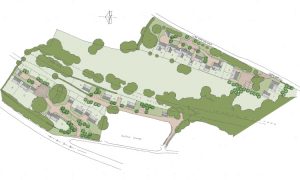Revised Glasbury School site development proposal
Latest News
Powys has received amended plans from the developer in relation to the Tramroad Cottage application. The amendments remove the ‘upper’ section of the scheme and reduces the development to five dwellings. The new plans will be uploaded to Powys website in due course.
Notes to date:
In July 2017 the developer made significant changes to the initial application to develop the site of the old Glasbury School/Tramway Cottage Site
This would have resulted in a ribbon (or ‘strip’) development along the A438 road between Glasbury and Three Cocks, effectively joining the two villages with a thin chain of houses along the roadside, with no associated facilities or village centre. The proposal was incoherent, and flew in the face of the Local Development Plan (LDP), which your Community Council discussed at length with local residents so we could be sure to represent your views.
Powys indicated it may be intending to disregard the LDP and allow a development which was completely contrary to the express wishes of this Community.
Remember, this development is IN ADDITION TO the Community’s preferred sites, which have already been earmarked for development on the western boundary of Three Cocks, at the junction with the A4078 Talgarth road, and the land opposite the Old Barn Tearooms in Three Cocks itself.
The Planning Officer in Charge of this application is Gemma Bufton, and she may be contacted by e-mail: planning.services@powys.gov.uk
Tips and notes:
There is now a mandatory pre-application community consultation for Major Development applications.
In a nutshell the planning process is a vehicle by which to enable sustainable development, give permission to develop, and to allow change of land use. The Welsh Government is eager to signal that Wales is ‘open for business’ and therefore wants to streamline the planning process, where possible.
The process is composed of two parts:
- Planning policy – as per the LDP framework
- Planning Applications Process – what specific policies are relevant to each planning application.
The Welsh Government is keen to implement the ‘Development Management Process’ where the Local Authority works collaboratively with developers and other stakeholders (including Community & Town Councils). It says it wants to foster ‘partnership and inclusiveness in the delivery of key priorities and outcomes’, which means that the only way to challenge or influence a proposed development is by reference to specific areas of the Local Development Plan (LDP).
The Glasbury School/Tramways Cottages development falls into the Major Development category of development, since it includes more than ten houses, and although the impacts may be significant they are not of national importance. It is controlled by the Local Authority (Powys Council).
Developers proposing a Major development MUST:
Publicise a detailed draft of the application, consult local community (including community & town councils), and write a pre-application consultation (PAC) report.
Consultation
Once the application has gone to consultation there is a period of 21 days during which interested parties may respond. There is anecdotal evidence to suggest that some developers have timed their applications to be submitted immediately after Community/Town Council’s meetings, knowing that the 21 days would expire before the council next had a chance to discuss. A 7-day extension can be applied for, but it is at the discretion of the Local Planning Authority (LPA) whether it is granted. The closer to the end of the process the less likely the LPA is to grant an extension.
Any engagement with planners must be framed within the context of the LDP policy for it to be considered, and it’s the only basis on which a challenge to an application is likely to succeed. Along with the material considerations (environmental impact, road safety etc) objections must cite policies within the LDP when engaging with planners in order to influence a proposed development.
It is important to note that only the applicant can appeal against a decision once it is made.
In summary:
- If you wish to object to a proposed development, do it as early in the process as possible
- You must submit a new objection if a developer makes an alteration to an existing planning application
- Ensure every stage of your objection refers to the Local Development Plan (LDP), and explain why the proposed development contravenes the Plan
- Expect developers to operate tactically to ensure that community objections cannot be lodged within the 21-day period for consultation
For more details – click here.

